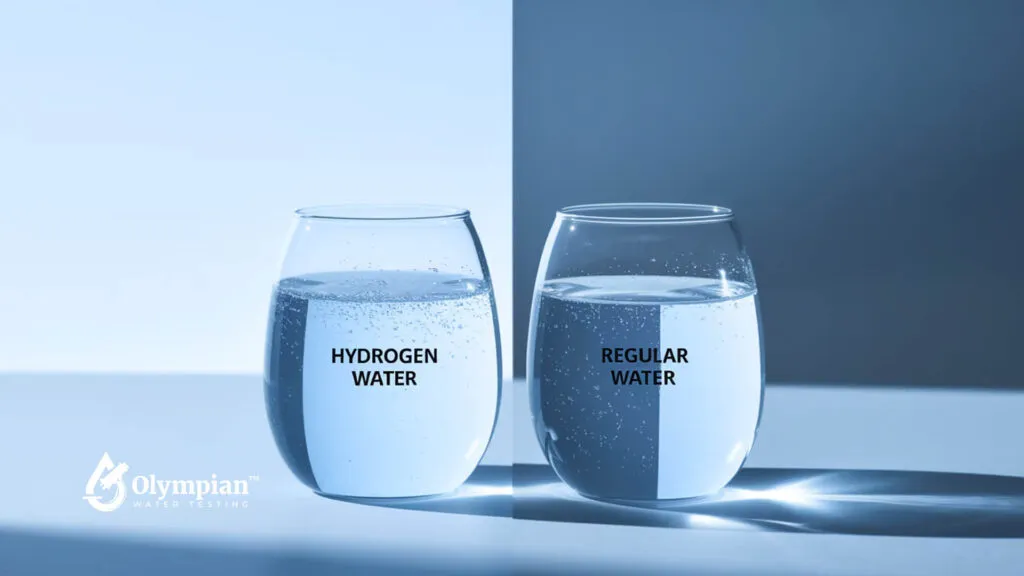Water is essential for life, but what if simply drinking it could do more for your health? Enter hydrogen water – regular water infused with molecular hydrogen (H₂), a gas that some claim carries powerful health benefits.
- The Core Science: How Hydrogen Behaves in Water & the Body
- How Hydrogen Dissolves in Water
- Hydrogen at the Cellular Level
- Oxidative Stress & Free Radicals
- Scientific Debate
- Potential Health Impacts: What Science Says (and What It Doesn’t)
- The Process: How Hydrogen Water is Created
- Electrolysis: Splitting Water to Release Hydrogen
- Magnesium Reaction: Hydrogen from a Chemical Reaction
- High-Pressure Infusion: Maximizing Hydrogen Retention
- Factors Affecting Hydrogen Retention
- Hydrogen Water vs. Misconceptions: Separating Science from Hype
- Myth 1: Hydrogen Water Cures Diseases
- Myth 2: More Hydrogen = More Benefits
- Myth 3: Hydrogen Water Works Instantly
- Myth 4: All Hydrogen Water Products Are Equal
- The Role of the Placebo Effect
- Choosing the Right Hydrogen Water Product: A Practical Guide
- Types of Hydrogen Water Products
- Key Factors in Choosing a Reliable Product
- Red Flags in Low-Quality Products
- High-Quality Hydrogen Water vs. Gimmicks
- Conclusion
The concept has gained traction due to its potential antioxidant and anti-inflammatory properties, sparking curiosity among health enthusiasts, athletes, and even researchers.
But with rising interest comes skepticism – does hydrogen water truly deliver, or is it just another wellness trend wrapped in science-y language?
Whether you’re considering trying it or just want to understand the facts, this guide will give you the clarity you need.
The Core Science: How Hydrogen Behaves in Water & the Body
Unlike oxygen, which actively reacts with other molecules, molecular hydrogen (H₂) is chemically inert under normal conditions – so how does it interact with the body?
How Hydrogen Dissolves in Water
Molecular hydrogen (H₂) is a neutral, non-polar gas that dissolves in water without forming new compounds. It remains as dissolved gas, similar to carbon dioxide in carbonated drinks. Methods like electrolysis and magnesium reaction increase hydrogen concentration in water.
Hydrogen at the Cellular Level
H₂ diffuses freely through cell membranes due to its small size. Unlike vitamins or minerals, it does not bind to receptors but reaches tissues, including the brain, within minutes.
Oxidative Stress & Free Radicals
Free radicals, particularly hydroxyl radicals (•OH), cause cellular damage. Hydrogen has been observed to selectively neutralize hydroxyl radicals, converting them into water without disrupting other necessary biological processes.
Scientific Debate
Some studies indicate hydrogen’s potential to reduce oxidative stress, but results vary. Factors like dosage, concentration, and test conditions impact findings. Large-scale human trials are limited, preventing definitive conclusions.
Potential Health Impacts: What Science Says (and What It Doesn’t)
Current Research: Mixed Findings
Some studies suggest that hydrogen water may help reduce oxidative stress and inflammation, but clinical evidence is inconsistent. While lab and animal studies show promising results, human trials are limited in size and methodology.
Key Areas of Study
- Inflammation & Recovery: Some research indicates that hydrogen water may lower markers of inflammation, but long-term effects remain unclear.
- Athletic Performance: A few small studies suggest improved muscle recovery and reduced fatigue, but no conclusive proof of performance enhancement.
- Cognitive Health: Preliminary findings explore its role in neuroprotection against conditions like Parkinson’s and Alzheimer’s, but clinical validation is lacking.
What Remains Unproven
Hydrogen water is often marketed as beneficial for metabolism, aging, and immunity, yet no large-scale human trials confirm these claims. Effects may vary based on dosage, absorption, and individual factors.
Hydrogen vs. Other Antioxidants
Unlike Vitamin C or E, which neutralize a broad range of free radicals, hydrogen selectively targets hydroxyl radicals. However, its long-term impact compared to traditional antioxidants remains unknown.
The Process: How Hydrogen Water is Created
Electrolysis: Splitting Water to Release Hydrogen
Electrolysis uses electrical current to split water (H₂O) into hydrogen (H₂) and oxygen (O₂). In hydrogen water generators, this process occurs in a sealed chamber, allowing only H₂ to dissolve into the water while oxygen is released. This method provides consistent hydrogen concentration, but the level depends on electrode quality and water composition.
Magnesium Reaction: Hydrogen from a Chemical Reaction
When magnesium (Mg) reacts with water, it produces hydrogen gas and magnesium hydroxide:
- Mg+2H2O→Mg(OH)2+H2↑
This method is common in hydrogen tablets and some water filters. It is cost-effective but may lead to lower hydrogen concentration over time due to reaction variability.
High-Pressure Infusion: Maximizing Hydrogen Retention
By exposing water to high-pressure molecular hydrogen gas, manufacturers can achieve higher dissolved hydrogen concentrations. Sealed aluminum pouches or pressurized bottles help prevent hydrogen escape, making this method ideal for pre-packaged hydrogen water.
Factors Affecting Hydrogen Retention
- Temperature: Hydrogen escapes faster in warm water, so cold storage preserves concentration.
- Pressure: Pressurized containers maintain higher H₂ levels.
- Material: Glass and plastic allow hydrogen to diffuse over time, while aluminum and specialized polymer bottles offer better retention.
Hydrogen Water vs. Misconceptions: Separating Science from Hype
Myth 1: Hydrogen Water Cures Diseases
Some claims suggest hydrogen water can treat or cure conditions like diabetes, cancer, or heart disease. While research explores its potential antioxidant and anti-inflammatory effects, there is no clinical proof that it can replace medical treatments.
Myth 2: More Hydrogen = More Benefits
Some products advertise extremely high hydrogen concentrations as more effective. However, the body does not store hydrogen, and excess amounts simply dissipate or are exhaled. Scientific studies focus on moderate, bioavailable doses, not extreme concentrations.
Myth 3: Hydrogen Water Works Instantly
Marketing often implies that drinking hydrogen water leads to immediate energy boosts or detox effects. In reality, any perceived effect is likely due to hydration itself or the placebo effect—a well-documented phenomenon where belief in a product influences perceived benefits.
Myth 4: All Hydrogen Water Products Are Equal
Hydrogen levels vary across different production methods, and some products lose hydrogen quickly due to poor storage materials. Not all hydrogen water retains its potency, making packaging and concentration levels important factors.
The Role of the Placebo Effect
Many users report feeling more energetic or healthier after drinking hydrogen water. While some effects may stem from real physiological mechanisms, a portion can be attributed to expectations and beliefs in the product.
Choosing the Right Hydrogen Water Product: A Practical Guide
Types of Hydrogen Water Products
- Pre-Packaged Hydrogen Water – Sold in sealed aluminum pouches or cans to retain hydrogen. Convenient but can be expensive.
- Hydrogen Water Generators – Use electrolysis to produce hydrogen-rich water on demand. Ideal for long-term use. This is the freshest and most efficient way to incorporate hydrogen water in your routine.
- Hydrogen Tablets & Sticks – Tablets dissolve in water, releasing hydrogen via magnesium reaction. Portable but may have inconsistent hydrogen levels.
Key Factors in Choosing a Reliable Product
- Hydrogen Concentration: Look for measured ppm (parts per million) values, ideally above 1.0 ppm for effectiveness.
- Durability & Ease of Use: Generators should have quality electrodes and be easy to maintain. Tablets should fully dissolve.
- Retention: Pre-packaged hydrogen water should be in airtight, non-permeable containers (avoid plastic bottles).
Red Flags in Low-Quality Products
- No Verified Hydrogen Levels: If a product doesn’t specify ppm levels, it may not contain enough hydrogen.
- Plastic Packaging: Regular plastic bottles allow hydrogen to escape quickly.
Unrealistic Claims: If a product claims to cure diseases or offer instant results, it’s a red flag.
High-Quality Hydrogen Water vs. Gimmicks
Reliable products provide tested hydrogen concentrations and use proper storage methods. Gimmicks often rely on branding without transparent data.
If you’re considering investing in a reliable hydrogen water bottle that offers both performance and retention, Click Here to explore trusted options customized to your lifestyle.
Conclusion
Hydrogen water is backed by emerging science, with studies suggesting potential benefits for oxidative stress and inflammation.
For those curious, it may be worth trying, but approach it with realistic expectations. Don’t rely on marketing – check research, look for verified hydrogen levels, and choose high-quality products.

















